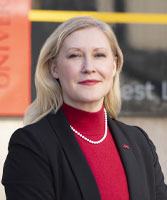
Greetings! If we haven’t yet had the pleasure of meeting, I’m Emily Hurst, dean of the HSHSL and associate vice provost of UMB. Over the course of my career, I have had opportunities to meet and collaborate with faculty librarians and staff from the HSHSL – and I have learned much from those experiences. Library leaders, like retired long-time dean, M.J. Tooey, helped broaden my understanding of how health sciences libraries can better serve their users – both those within their institutions, and those who live and work in the surrounding communities. Now, I am delighted and honored to be embarking on a new role leading the dynamic HSHSL team.
Since my February 1, 2024 start date, I have had the opportunity to discuss the Library with many students, faculty, and staff, and I look forward to more of these engaging sessions in the months ahead. When I look around the Library and think about the rich history of the building, and the people and projects that came before me, I am excited about my future here. The HSHSL is a hub of activity. I have observed the ebb and flow of library users and building staff enjoying the services, spaces, and collections that make this a high-impact library. I look forward to leading the HSHSL team and leveraging our UMB and community partnerships to improve the Library, to build upon our past accomplishments, and to advance our mission by cultivating transformational learning, research, and community engagement.
The HSHSL needs your support as we make decisions about the services, programs, and resources you use. In the coming months, I plan to launch more formalized advisory committees that will allow me to incorporate your ideas and needs into a vision for the HSHSL in the next century. For now, you are welcome to submit ideas using this feedback form. No idea is too small or too big. I welcome all of your feedback as I chart the path forward.
I am excited about many issues impacting health sciences libraries today. I want to create inviting and collaborative spaces for all types of users, while ensuring library staff have safe and well-equipped working environments. I am excited to explore open educational resources and their potential to reduce the cost of textbooks – and to expand support for open access publishing. I believe that, as a premier research institution, UMB deserves access to the type of resources needed to conduct high-quality research. I also believe that those of us in higher education settings have an obligation to work collaboratively and respectfully with our communities, seeking partnerships that will enhance our communities and maximize their benefit.
I look forward to working with senior leadership and everyday users to create the library of the future.






